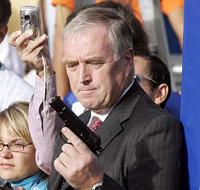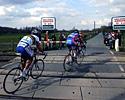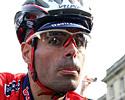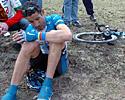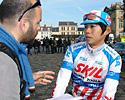First Edition Cycling News for April 11, 2006Edited by John Stevenson & Les Clarke UCI's McQuaid responds to Roubaix controversy"Safety is the most important consideration"By Shane Stokes
UCI president Pat McQuaid has weighed in to the debate over Sunday's disqualification of the second, third and fourth-placed riders in this year's Paris-Roubaix. Leif Hoste (Discovery Channel), Peter Van Petegem (Davitamon-Lotto) and Vladimir Gusev (Discovery Channel) forfeited their placings for passing through a closed level crossing, while a group containing Tom Boonen that crossed after the train had passed but the barriers were still down was not penalised. The riders, their directeurs sportifs and the race organisers have said that the decision was a severe one and that as it didn't affect the result in any real way, the UCI commissaires could have let the riders off with a warning. In response, McQuaid has clarified the reasons for the decision, explaining to Cyclingnews why he feels that the judges had no other choice. "I agree that it is a very difficult decision, a very severe decision for the three riders," he said by phone on Monday. "It was obviously also a difficult decision for the commissaires to come to, and this is probably reflected in the amount of time it took to arrive at the decision. But having said that, the rules are the rules. The riders know that, I'm sure it is not the first time they have been in that situation. From my point of view, the most important thing is that you must consider all the young cyclists who were watching that television coverage yesterday. If they saw those riders going through those gates and took that as example of what you can do and get away with, you can imagine the potential danger in future races. "Whilst I do agree that a lot of rules can be interpreted in relation to the spirit of the law, I feel that in this case the commissaires didn't really have a choice. It is a rule that you cannot really play with because of the inherent danger in allowing some thing like that pass by without sanctioning it."
Many people have asked why the next group containing Tom Boonen wasn't also disqualified. After all, they too passed through the same barriers while they were down. However McQuaid feels that there is an important distinction between the two cases. "The train had passed by that point so they therefore knew that the danger was gone," he argues. "It was different with the first group. If that had been a high-speed train and one of the three chasers was still crossing over the tracks, look at what could have happened." Prior to assuming the role of UCI President, McQuaid worked as a race promoter and organiser and says that there have been many times when he has had to stop breaks and groups at train lines. When asked if it is acceptable that a ProTour event should be subject to this kind of disruption, he says that it is difficult to avoid. "Cycling is a fully live sport, it is something which takes place out in the real world rather than a stadium. There are so many variables which can come into play in a bike race, so it means it is very difficult to have full control over things. Normally, if an organiser knows that there is a railway crossing on a race course, they make contact with people in advance of the race, find out when trains are coming through and see what can be done. "In some cases, an organisation may make an arrangement in advance that if it is only a goods train or a train which is not on a particularly high-speed line, that some arrangement can be made to stop the train and let the race pass by. But that is only in cases where the lines aren't particularly important. In the case of high-speed lines, that cannot be done. It is just an unfortunate situation within the race which has to be accepted." Under current rules, had Fabian Cancellara been stopped, he would have been compensated for the delay. "The normal ruling is that he would be given his advantage again," says McQuaid. "The commissaires would have put a watch on and given him the same time gap once the barrier was raised. But once the leader is through, you can't stop him at that point. "I understand the situation for those riders, having ridden for over 200 kilometres in very rough terrain and going at full belt at the time in trying to stay clear of Boonen's group to catch the leader. I do agree that the action had no material effect on the result of the race, because Cancellara was already well gone. But by the same token those riders knew what the rules were. I am sure it is not the first time that they have encountered something like that. Unfortunately there wasn't really a choice, as safety has to come first in a situation like this." Van Petegem not happy, Davitamon-Lotto to lodge written complaint
The day after missing out on a podium place in Paris-Roubaix through disqualification, Davitamon-Lotto's Peter Van Petegem had mixed feelings about ignoring a closed red-light railway passage which resulted in the disqualification, but his team have sent a clear message - they're not happy. The team is now lodging a written protest after examining footage of the closing stages. "I know but too well that you have to stop when you are in front of a closed red-light railway crossing," said the veteran rider to Belgian newspaper De Morgen. "I myself hit the brakes, but Hoste kept on going, Gusev followed and what does one do in a situation like that but follow? What if Cancellara had been in front of the closed railway passage and lost the race because of it?" he asked. "I agree we made a mistake, but the organisers are not without fault either," he continued. "I think it's strange that we have to cross a railway so close to the finish. At that moment we were still riding flat out chasing for the victory - Cancellara was not outside of our reach as yet," explained Van Petegem. "To take a decision like that after six hours of racing is hard. On top of that we didn't put anyone in danger; not ourselves, not others." Davitamon-Lotto team manager Marc Sergeant said of Sunday's events, "The set-backs keep coming - we aren't just losing a third placing today, but also points for the ProTour standings. And on top of that we lose Tom Steels for a while because of a broken collarbone," he said. Van Petegem praised the performance of Cancellara, saying, "Cancellara is a very good rider. Why I wasn't able to react when he made his last acceleration? You know how it goes... one rider is looking at the other and before you really know, the bird has flown. On Carrefour de l'Arbre I made a big effort and we lost Boonen, Flecha and Ballan. I think I can say that I have a strong week behind me - I showed that I'm not worn out yet," said the Belgian veteran. Trek to examine Hincapie's fork
Discovery team bike sponsor Trek is having the fork from George Hincapie's bike returned to its US headquarters for a "thorough evaluation." Hincapie sustained a broken bone in his shoulder when the steerer tube of his bike broke 45km from the finish, causing him to crash. Trek and Discovery say they suspect the crash was caused by damage sustained in an earlier incident. "George was in a crash earlier in the day, but due to race conditions and his comments that everything seemed fine, we did not change to his back up bike," said Discovery's directeur sportif, Johan Bruyneel, in a statement. Shortly before the second crash, Hincapie told team directors that he felt looseness in his steering and thought his headset may have come loose as a result of the earlier crash. The team was figuring out when and how to swap to his spare bike when Hincapie entered another cobbled section and crashed. "I believe that the first crash set the stage for the big crash", said Bruyneel. "Section after section the vibrations just kept coming until the damaged steerer gave loose." "The cobbles do not discriminate," said Julien De Vriese, the team's head mechanic. Marc Wauters' Roubaix swansongRabobank's Belgian veteran, Marc Wauters, remained upbeat about his Roubaix swansong in Sunday's race. "Mainly, I had a lot of dust in my eyes," he said afterwards. Despite finishing 37th, Wauters was satisfied with his performance and told De Morgen, "I do have a satisfied feeling left after my last Paris-Roubaix." He explained that Cancellara was just too good on the day, and at his age it was tough to keep up with the young guys. The 37-year-old said he'd be back next year with a beer in his hand as a PR man for Rabobank. First Japanese rider in Paris-RoubaixBy Miwako Sasaki
The 104th edition of Paris-Roubaix had a newcomer. Japanese rider Masahiro Shinagawa (Skil-Shimano) started the hell of the north Sunday, in what's believed to be the first appearance by a Japanese rider in the legendary race. The 24 year-old was Japanese U23 champion in 2004 and turned professional last year with Shimano-Memory Corp. It was hardly his first experience of European racing, though; Shinagawa came to Belgium as a 15 year-old and rode many kermis races in Flanders for four years. He was 17th in the first stage of the Tour of Belgium last year. As the first Japanese entrant in Paris-Roubaix, Shinagawa was interviewed by the international media before the start in Compiegne. It was a historic moment for Japanese cycling and Japanese fans will be hoping this won't be the last appearance by a Japanese rider in Paris-Roubaix. Shinagawa's dream ended after just 20 km when he punctured in te first hour of racing. Although this young Japanese got a taste of the hell in the Voiture Balai, his experience of the queen of the classics just started yesterday. He will come back again, like many riders in the world who love Paris-Roubaix, and he will arrive in the velodrome in Roubaix someday. Sastre's win completes 'super CSC weekend'Team CSC enjoyed a huge weekend of success, with victory in Paris-Roubaix and the Klasika Primavera, held in Spain over the weekend. Local boy Carlos Sastre took the win after he joined a small escape group when the peloton split on the race's most difficult climb. He attacked again and beat Lampre's Damiano Cunego in a sprint finish. "It was really nice to win a race again," said Sastre. "Yesterday's time trial was a perfect test for me, and I was very motivated to try something today. Lampre controlled most of the race, but in the final only a few riders were able to keep up. I attacked a couple of times on the last climb in order to split the front group and then I attacked again just before the finish," he explained. Sastre explained that the victory is a product of some very hard work in the off-season and early in 2006, something that bodes well heading into the season of grand tours. "When I was reeled in, I saved my strength for the sprint and I just managed to snatch the victory on the line. I've been working very hard to get into shape, so it's a big thing to be able to take a good result, and obviously it gives me motivation for the upcoming races," said a happy Sastre following the win. Quick.Step for Scheldeprijs VlaanderenQuick.Step's squad for Scheldeprijs Vlaanderen (April 12) will include Roubaix runner-up Tom Boonen, who'll be attempting to make amends for a disappointing race on Sunday with victory in the midweek classic. He'll be backed up by a solid lineup, which includes Kevin Hulsmans, Steven De Jongh and Servais Knaven. Early tipping suggests the wounded bull will charge hardest on Wednesday, and with plenty of form in his legs, the young Belgian is capable of the result. Quick.Step's riders for Scheldeprijs Vlaanderen: Tom Boonen, Wilfried Cretskens, Steven De Jongh, Kevin Hulsmans, Servais Knaven, Sebastien Rosseler, Geert Verheyen, Wouter Weylandt. Directeur sportif: Wilfried Peeters. Astarloa ready for Amstel, Fleche and LiegeTeam Barloworld's season kicks into another gear next week as it rides Amstel Gold Race (April 16), Fleche-Wallonne (April 19) and Liege-Bastogne-Liege (April 23). The team has been invited to these races as a result of strong early-season performances, and former world champion Igor Astarloa getting ready to lead the team in the hilly one-day races. After winning Fleche-Wallonne in 2003, Astarloa went on to win the world road race title later that year in Hamilton, Canada - but it's been slim pickings since then for the Spaniard. "Going back to Belgium is always nice because the roads and race routes really suit my style of racing and are where I can definitely do well," said Astarloa. "I hope that, like in 2003, the spring classics give me good luck for the rest of the season," he added. Personally, Astarloa hasn't had the best start to 2006, explaining that, "To tell the truth, I haven't got rid of all my bad luck - at both Tirreno-Adriatico and Criterium International I could have done better, but I know it's important to be optimistic." Astarloa enjoys all three Ardennes classics. "When you're really motivated all three races are special," he says. Astarloa goes into this year's editions of each with a positive outlook and greater motivation than in previous years. "I've got special memories of Fleche-Wallonne but I also really love Liege-Bastogne-Liege," he says. "Amstel Gold is also special because I know the organiser Leo Van Vliet very well. He helped me a lot when I had some problems during last season and for that reason I really want to do well in Holland." Women to race for breast cancer researchThe Komen Central Georgia Cycle for the Cure, to be held in Macon, GA, on April 18, will feature some of America's best female riders competing for $5000 in prizemoney while raising awareness for breast cancer research. The city will host two criteriums as part of the Tour de Georgia - a category 3 and 4 race before a category 1 and 2 race lights up the streets of downtown Macon. The category 3 and 4 race will start at 1:00 before the category 1 and 2 riders take to the streets at 2:15. Following the finish the public is invited to meet the teams at the "Feed Zone Fiesta", an evening of dinner, drinks, and dancing at the Georgia Sports Hall of Fame at 6:00pm. All cycling participants will receive one free admission to the event which includes dinner and refreshments. Additional tickets for family, friends, and cycling enthusiasts are available for $20. Online pre-registration is encouraged and ends midnight Saturday, April 15, 2006. Registration on the day of the event opens at 10:00 am and closes at 12:00 pm. Please go to www.KomenCentralGa.org for more details and click on Cycle for the Cure for details and online registration.
(All rights reserved/Copyright Knapp Communications Pty Limited 2006) |

|
January 2009 |
Recently on Cyclingnews.com |

